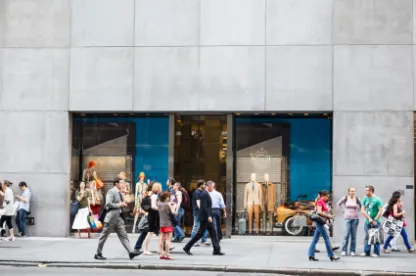RETAIL INDUSTRY 2021 YEAR IN REVIEW
When the COVID-19 pandemic began, businesses anticipated the possibility of a tidal wave of personal injury and wrongful death lawsuits from employees, their family members and customers. However, as we approach the two-year mark in the pandemic, we have not seen these lawsuits materialize in the numbers anticipated. Instead of thousands of lawsuits, there have been only a few hundred—most of these against nursing homes and cruise lines associated with outbreaks in March and April 2020. Claims brought by or on behalf of employees who contracted COVID-19 in the course of their work have primarily been steered to the workers’ compensation system, where they belong. Attempts to avoid the exclusive remedy of workers’ compensation through intentional tort exceptions or expansive public nuisance theories have almost universally failed in the courts. Further, while a handful of “take-home” exposure claims by family members and suits by customers or visitors to premises have been filed, they have thus far met mixed success in the courts given the significant challenges associated with proving causation and duty in the face of a ubiquitous and highly contagious virus.
Workers’ Compensation Coverage for COVID-19 and Exclusive Remedy for Employee Claims
It is estimated that more than 100,000 COVID-19–related workers’ compensation claims have been filed by employees or employees’ family members since March 2020.
In most jurisdictions, workers’ compensation is an employee’s exclusive remedy for a “workplace injury” or “occupational disease.” As a result, injured employees generally may not sue their employers in tort for personal injury or wrongful death. In the early months of the pandemic, it was not clear whether COVID-19 would be considered a compensable work-related injury in many states or, rather, an “ordinary disease of life” like the flu, outside the scope of workers’ compensation coverage. However, since that time, many states through legislation or statements of policy or opinions from the applicable workers’ compensation commission have deemed COVID-19 covered by workers’ compensation. In these states and others, courts have dismissed lawsuits on the basis that workers’ compensation exclusivity bars employee tort claims. See, e.g., Barker v. Tyson, No. 21-223 (E.D. Pa.); Diaz v. Fruit Harvest Family, Inc., No. 20CECG03608 (Cal. Sup.); Evans v. WalMart, No. 2020L003938 (Ill. Cir.).
Employee Attempts to Avoid Workers’ Compensation Exclusivity
Plaintiffs’ lawyers have formulated creative arguments in an effort to avoid workers’ compensation exclusivity and file lawsuits on behalf of employees. However, to date, the majority of these attempts have been unsuccessful in the courts. Several suits have been filed asserting the “intentional tort” exception built into many states’ workers’ compensation statutes. While the scope of this exception varies from state to state, in most circumstances, an employer may be sued in tort when the employer acted with the intent to injure the employee, or with the belief or knowledge that injury was substantially certain to occur. In an attempt to invoke this exception, some plaintiffs have argued that their employer’s conduct with respect to COVID-19—e.g., failing to adopt or enforce safety protocols that complied with state or federal public health guidance—rose to the level of intentionally causing harm to employees. Such arguments have largely failed, as courts have found that employers’ conduct in these cases was at most grossly negligent or reckless, and did not amount to an intentional tort. See, e.g., Lathourakis v. Raymours Furniture Co., No. 59130/2020 (N.Y. Sup.);
Evans v. Wal-Mart, No. 2020L003938 (Ill. Cir.). In addition, at least one state— Arkansas—has amended its workers’ compensation law to clarify that requiring an employee to perform work when exposure to COVID-19 is possible, likely or certain does not qualify as intentional conduct. Ark. H.B. 1488.
A less common approach to avoid workers’ compensation exclusivity has been for employees to bring lawsuits against their employers based on a “public nuisance” theory. These cases have typically alleged that an employer has caused a public nuisance by creating an environment where COVID-19 can rapidly spread. Courts have also rejected these claims, finding that plaintiffs have failed to plead the “special injury” required to assert a claim for public nuisance. See, e.g., Massey v. McDonald’s, 2020CH04247 (Ill. Cir.); Wicker v. Walmart Inc., No. 5:2020cv02166 (C.D. Cal.). Some courts have further held that public nuisance claims brought by employees seeking monetary damages—as opposed to merely injunctive relief— are barred by workers’ compensation exclusivity. Hess v. United Parcel Service Inc., No. 3:2021cv00093 (N.D. Cal.).
Take-Home Exposure and Customer Lawsuits
COVID-19 exposure claims brought against businesses by nonemployees have also seen little success thus far, and have been filed with significantly less frequency in 2021 than at the start of the pandemic. Household members of employees have attempted to recover for “take-home” claims against employers, where they allege exposure to COVID-19 allegedly “brought home” by the employee from his or her place of work. Since the first take-home lawsuit was filed in June 2020, less than 20 such claims have been filed. Courts have dismissed some of these cases, finding that there is no “special relationship” between the employer and the family member that would give rise to a duty of care. Estate of Madden v. Southwest Airlines, No. 1:21-cv-00672-SAG (D. Md.); Iniguez v. Aurora Packing, No. 20-L-000372 (Ill. Cir.).
Less than 50 COVID-19–related personal injury or wrongful death lawsuits were filed by customers in 2021, none of which allege exposure to COVID-19 against a retailer. Moreover, although dozens of claims were filed against nursing homes in 2020, 2021 did not continue to see the same trend. Rather, the vast majority of nonemployee COVID-19 exposure cases in 2021 were brought against cruise lines by passengers for injuries incurred on cruises between February and April 2020. One possible explanation for this trend is that the ubiquity of the virus has made it challenging for plaintiffs to plausibly allege that they contracted the virus at a particular defendant’s business, as opposed to any other business or public space, at work or in their own homes. In this context, cruise ships provide a unique opportunity for plaintiffs to adequately plead causation, given their confined environment.
Nonetheless, plaintiffs in cruise line cases have still faced challenges, both with respect to causation, e.g., Birkenholz v. Princess Cruises, No. 2:20-cv-02963 (C.D. Cal.), as well as on other fronts. In particular, because COVID-19 safety protocols have changed—and continue to change—over time as understanding of the virus evolves, it is difficult for plaintiffs to prove that a defendant violated an established standard of care. For example, a defendant may point to CDC guidance for the time period at issue to demonstrate that it was not yet under a duty to adopt certain protocols, such as masking, quarantining or testing. See Hachinsky v. Princess Cruises, No. 2:20- CV-02963 (C.D. Cal).
Finally, claims by retail customers have simply not materialized. In the last year, retailers have not seen any customer claims arising from exposure to COVID19 at their businesses. The few COVID19–related claims filed against retail pharmacies in 2021 have alleged injuries unrelated to exposure to the virus–for example, injuries arising from a selfadministered COVID-19 test. Nobre v. Holiday CVS LLC, No. 2021cv60879 (Fla.Cir.). In addition to the challenges associated with proving causation, the nonexistence of customer claims may be due in large part to COVID-19 business immunity laws. Since the start of the pandemic, at least 30 states have passed immunity legislation, providing liability protection for businesses in relation to COVID-19 claims. Although coverage varies from state to state, these laws generally prohibit lawsuits alleging COVID-19 exposure absent a showing of gross negligence, willful misconduct or failure to follow applicable public health orders. Thus, even where customers can adequately allege causation, there are still significant hurdles to establishing liability for businesses.
Conclusion
Although the COVID-19 pandemic has catalyzed a vast and diverse body of litigation, retailers and other businesses have not seen the tidal wave of personal injury and wrongful death lawsuits that were initially predicted. This is due in large part to states’ workers’ compensation regimes, which generally bar tort claims by employees for workrelated injuries. Novel arguments raised by plaintiffs over the last two years have largely failed to circumvent that framework.
Furthermore, pleading causation and breach of duty in the context of COVID-19 has proven particularly challenging for many plaintiffs due to the pervasive nature of the virus and experts’ evolving understanding of its transmissibility. While the statute of limitations for COVID-19 lawsuits will be two to three years in most jurisdictions, and thus has not yet expired even for those claims arising at the very beginning of the pandemic, a future onslaught of lawsuits seems unlikely given the lack of early success.
With these limitations in mind, the best litigation avoidance strategy for businesses remains compliance with applicable state and federal guidance, even as it evolves and becomes more difficult to enforce in a fatigued population. Businesses should continue taking reasonable measures to protect their employees and customers from exposure to COVID-19, including by adapting protocols as necessary to track the best practices set forth in changing public health guidance. To the extent the tidal wave or even a trickle of COVID-19 lawsuits against retailers materializes over the next few years, demonstrating compliance with operative federal, state and local requirements related to COVID-19 remains the best defense to personal injury and wrongful death claims.





 />i
/>i

